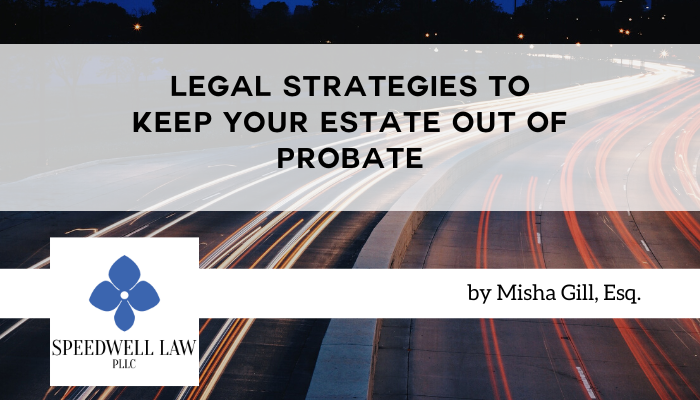
Legal Strategies to Keep Your Estate Out of Probate
Death is an inevitable part of life, and with it comes the legal process known as probate. While many wish to spare their loved ones the complexities and public scrutiny associated with probate, few know the strategies available to avoid it.
In this blog post, we explain what probate is and discuss four simple yet powerful strategies that can help keep your estate out of probate, and grant you and your heirs a smooth transition of your assets.
What is Probate?
Probate is a legal process that occurs when a person passes away, in which a court oversees the distribution of their property and addresses any outstanding debts. The court appoints a representative to ensure that debts are paid, and if there is a will that meets state requirements, the court follows its instructions for the distribution of the deceased’s assets. In the absence of a will, the deceased’s property is distributed according to Virginia’s intestate succession statutes.
However, having a will does not automatically avoid probate, and the probate process can be time-consuming, expensive, and make the deceased’s financial matters public. Fortunately, there are strategies you can employ to keep your estate out of probate and avoid its associated drawbacks. Here are some options:
1. Transfer Property to a Revocable Trust
A revocable trust, also known as a living trust, allows you to maintain control over your property during your lifetime. Then, upon your death, the property passes to the trust’s designated beneficiaries without going through probate. This is particularly useful for those with sizable estates or multiple beneficiaries.
2. Give Away Property During Your Lifetime
You can allow some assets to avoid probate by giving them away during your lifetime. This can help reduce the tax burden on your estate and avoid public scrutiny. However, keep in mind that giving away property also means relinquishing control over that property.
3. Name Beneficiaries
Certain assets, such as savings accounts, investment accounts, retirement accounts, and life insurance policies, allow you to designate beneficiaries. Upon your death, ownership of these assets automatically transfers to the named beneficiaries, bypassing probate.
4. Take Advantage of Joint Ownership
Property held in joint tenancy with rights of survivorship (JTWROS) automatically transfers to the surviving owner upon the death of one owner. This is commonly used between spouses but can also be extended to other individuals. However, you should be aware that making someone a joint owner may have gift tax implications.
Consult with an Experienced Virginia Estate Planning Attorney
It is essential to recognize that estate planning goes beyond just avoiding probate. It also enables you to plan for the future, protect your heirs’ privacy, and secure their financial well-being.
Estate planning involves creating a comprehensive plan to address various aspects of your assets and ensure a smooth transition after your passing. Consulting with an experienced Virginia estate planning attorney can provide further guidance tailored to your specific situation.
Call our law firm today at (703) 553-2577 or use the contact form to schedule a consultation and to learn more.
The information on this site is for general informational purposes only. The information presented in this site is not legal advice or a legal opinion. You should seek the advice of legal counsel of your choice before acting upon any of the information in this site.





